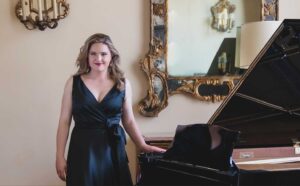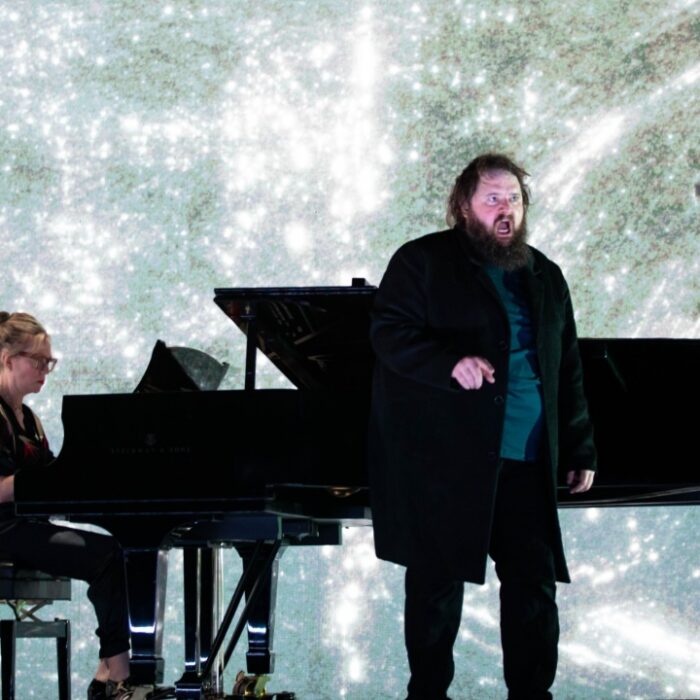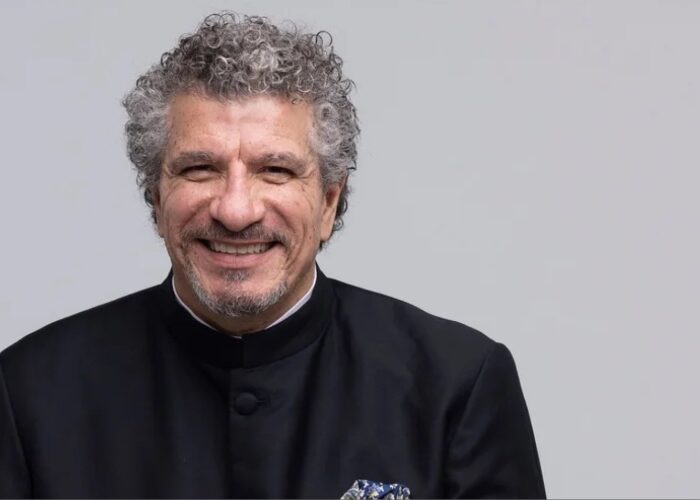
Q & A: Soprano Chiara Isotton on Her Debut at the Royal Opera House & Performing the Role of Tosca
By Mike Hardy(Photo: Michele Monasta)
Italian Soprano Chiara Isotton is a graduate of the Benedetto Marcello Conservatory in Venice, and is a member of the La Scala Academy, Milan. She won several important national and international competitions, including being among the winners of the “European Community” Competition for Young Opera Singers by the Teatro Lirico Sperimentale di Spoleto in 2013 where she debuted her role of Tosca. She has been described as “possessing an imposing voice of equal beauty, homogeneity and confidence in all registers.”
OperaWire caught up with Chiara at the Royal Ballet and Opera House in Covent Garden on the eve of her “Tosca” debut.
OperaWire: Hello Chiara. Congratulations on your debut at the Royal Opera House. How does it feel to be here?
Chiara Isotton: Oh my god, it’s really like a dream that has become true, really because you know, this production to me is so iconic. It’s historical. I remember I was a student when I first saw Kent’s “Tosca” around 18 years ago, so to have the opportunity to be in this production is really a dream come true.
OW: You open tomorrow. How have rehearsals been going?
CI: Yeah, rehearsals are going really well. SeokJong Baek is amazing! That guy, it’s a miracle, really, because his voice is like the sun. He’s a fantastic actor, he’s a fantastic singer, he’s a fantastic guy.
OW: And, of course, you have Sir Bryn Terfel, who performs a great Scarpia.
CI: Oh yes. When I rehearsed with him, it was so easy, he’s amazing too. He’s the iconic Scarpia, his interpretation of the role is already legendary. Singing with him was truly inspiring and so easy, because I only have to react to what he’s doing onstage, and it carries me through the role on the wave of his energy.
OW: You have actually sung this role quite a lot. Tosca was your official debut. How do you prepare to play her and is it different every time? Do you seek to change it every time?
CI: Yes, it was my official debut eleven years ago. So, I try to start every time in the same way when I’m preparing for a role. With Tosca I have my idea about the character of course because over the years I have built up ideas about who she is, but I love to do every production as a debut, as though it’s the first time that I’m singing that role. I think that is a great way to approach it because in this way you can find all the little things that are new and find different shadows and find a different way to sing maybe the same phrase. Every production is special for me. Of course there is the musical preparation with coaches, with teachers and everything but for me the acting preparation that I do is very important. For example, I’ll spend hours with my coach, Patrick Cann, going over the correct intention for each line, like an actor would.
So, I worked on the character from the beginning, from the original work by the dramatist Sardou. It’s really, really good for the singer because you are going to understand very well the relationships between characters. And then we are so lucky that the music of Puccini is so clear and he literally tells everything to us, literally everything. There isn’t a note, there isn’t a pause, there isn’t the value of a note that does not matter; no, no, there is a meaning behind that, and so we have to study the score again, every time we have to play it. For example, now preparing for the performance here, I was surprised because I never noticed certain key things in the score. So, for me, it’s really a blessing to be able to do that and I hope you can see that the role is growing with me. I think that’s the beauty of it and really, I’m very grateful about that. I think it’s special.
OW: There are many acclaimed artists in the profession from America, the Far East and elsewhere in Europe. As a native Italian, do you feel pressure when performing keynote Italian roles?
CI: Of course, I feel some pressure because I am aware of the responsibility of singing in such an important stage as this one. But at the same time, I really want to use this feeling of “pressure,” I prefer to call it energy, to give my best. I really believe that I’m really lucky. Of course Italian is my native language, so you know, maybe I have an advantage over artists who are not native Italian speakers. Maybe I have a little less work to do in that respect compared to other colleagues, but at the same time I do feel the responsibility because I think that this tradition is one of the beautiful things that my country has, you know?
I want to show my best in this Puccini anniversary, to remember a composer that really gives so much to the world. Puccini was a smart man. As a smart man and as a smart musician, his ears were constantly open to catch everything, from composers, but also from life, from everything. For example, at the beginning of the third act in Tosca, there are the bells. Puccini studied the mattutino, how the bells sound in Roma. So, he studied all the sounds….the different bell tones… that existed in Roma at that hour of the morning. So one can actually recognize all the different bells from all the different churches of Roma at the beginning of the third act in “Tosca;” and the big bell is the bell of San Pietro in the Vatican. So, Puccini had super, super sensitive ears and a mind that could catch everything. He’s able to speak with, and to give something to the smartest professor, you know, the biggest experts; but also, to the person that is listening to opera for the first time.
OW: You say you consider yourself very lucky and I was looking through your past performances. Your career started in 2007, but then there’s quite a gap until around 2013 with only a few performances… Is it fair to say you’ve had to work really hard for little result for often long periods?
CI: (Laughing) Yes. To me, now that I’m a little bit older, and I can take a look behind me, I’m happy about my journey. Exactly. And I’m also grateful about that, because singing this repertorio is not something that you can do when you are too young, to be honest. You need really to have the maturity; not only a vocal maturity, but also life maturity to properly approach these roles and these operas. I think, you know, maybe there are some young people that have these skills, but it’s very tricky. So, I’m happy because when I started, I did the Accademia at La Scala, I worked for some years, doing small roles in the theatre. And I am very grateful because in those years I had the opportunity to study, with minimum vocal strain because the work was less demanding on the voice; perhaps singing for just a few minutes in an opera compared to singing three hours! So, I had more time for preparing roles and for studying to give the right time for my voice to grow and for me to grow with my voice. Maybe in the past I was frustrated at just doing little things, small roles, but now I’m very grateful.
Everyone is different and their journeys and paths are different. I also was fortunate to have the opportunity to work with great conductors, great directors, and the fortune of having a lot of big opera singers around me and really, I learned so much.
OW: Who inspired you to be an opera singer, and when did you realize you wanted to sing?
CI: I always sang throughout my life because I was singing in a children’s choir in my hometown. I’m lucky because in my family nobody is a musician, but everyone loves music. So that was very important because we sang as a family, you know, so that was something that was all the time part of my life. But I started to consider singing as a profession when I was studying in the Conservatorio and at university.
I don’t want to seem banal, but my heroine was always Maria Callas. She was always so inspiring for me since forever, to be honest. Her career wasn’t so long, but….oh!…. what she gave us in those years. There were and are a lot of great singers, a lot of fantastic interpreters, but I think there are very few with that something more, and she was one of them, and the total honesty that she put in her singing is something that’s unbelievable.
HER Tosca, conducted by de Sabata with di Stefano and Gobbi, to me….oh! (laughs)…is my absolute favorite for a lot of reasons. Because of the three of them, because of the conducting, and for me, and even though there are other great recordings of “Tosca,” she was something else. You know, I read a lot about her. I don’t want to sound melodramatic but she’s the perfect example of how our life can be reflected in our voice. And I think that she had, really not an easy life. Not at all.



